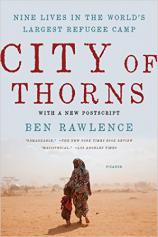City of Thorns: Nine Lives in the World’s Largest Refugee Camp
Review
City of Thorns: Nine Lives in the World’s Largest Refugee Camp
There is a city, home to tens of thousands since 1992, near the Kenya-Somali border, that doesn’t officially exist. It is Dadaab refugee camp, established to temporarily house refugees from across eastern Africa. But now a second generation of displaced people are being born in the camp; three generations have no other home besides the smaller camps and towns that make up Dadaab. Somalis, Sudanese, Ethiopians and others live together in the congested camp surrounded by the brutally dry and inhospitable desert, competing for resources and dreaming of a life of security.
The political machinations behind Dadaab are complicated and even shady, but Ben Rawlence casts light on them for readers in CITY OF THORNS. His primary aim, however, is to share the lives of some of the inhabitants he got to know while working in and researching Dadaab.
"Profound, poignant and frequently horrific, [CITY OF THORNS] offers a significant and meaningful examination of an oft-ignored and little-understood population."
Rawlence focuses his narrative on a few individuals, couples and families. There is Tawane, an intelligent leader who came to the camp in 1991 having lost his brothers. Tawane and his wife, Apshira, have lived together in Dadaab since 2003. Guled fled his home in Mogadishu in 2010 and is married to Maryam. Muna, born in Somalia, came to the camp in 1991 when she was just a year old and has lived there ever since. Muna’s husband, Monday, is a former Sudanese child soldier and lived in other camps before settling in Dadaab. Nisho was actually born on the way to Dadaab as his parents were fleeing war-torn Somalia in 1991. Kheryo studies for years for a way out of the camp and into a better life.
Each person Rawlence introduces has suffered heartache and much worse. Each does their best to survive in the bleak, depressing and corrupt culture of the camp. Some succumb to addiction or apathy, while others fight to immigrate to Italy, Australia or the US. Some pursue education, while others take the most menial jobs to support their families. Some try to return home to find that their position is perilous, both inside Dadaab and outside its borders.
The residents of Dadaab live in extreme poverty, struggling for food, clothing and the necessities of life. They are astonishingly vulnerable to illness, violence and rape, not to mention depression, anger and sorrow. Rawlence depicts all this with a journalist’s objective style but not without tenderness. In discussing the politics operating within and without Dadaab, CITY OF THORNS occasionally falters. The topic is frustratingly complex, and Rawlence does his best to put the camp in a larger geopolitical and historical context. But readers unfamiliar with eastern African conflicts and culture may get bogged down in the complicated details, acronyms and policies.
However, when Rawlence is sharing the lives of the inhabitants of Dadaab, those he came to know over a four-year period, the narrative has a compelling energy and even graceful style. He gives readers a glimpse into the dreams those living in Dadaab have, as well as the terrible obstacles they face in achieving them. All those he writes about do their best to maintain their cultural and religious identities, marriages, family ties and dignity in the harshest of conditions. Their stories and lives, mostly invisible and voiceless to the world, are important yet difficult to read about.
CITY OF THORNS is a good introduction to Dadaab in particular and the harrowing lives of refugees in general. Profound, poignant and frequently horrific, it offers a significant and meaningful examination of an oft-ignored and little-understood population.
Reviewed by Sarah Rachel Egelman on January 15, 2016
City of Thorns: Nine Lives in the World’s Largest Refugee Camp
- Publication Date: January 3, 2017
- Genres: Cultural Studies, Current Affairs, Nonfiction
- Paperback: 400 pages
- Publisher: Picador
- ISBN-10: 1250118735
- ISBN-13: 9781250118738





